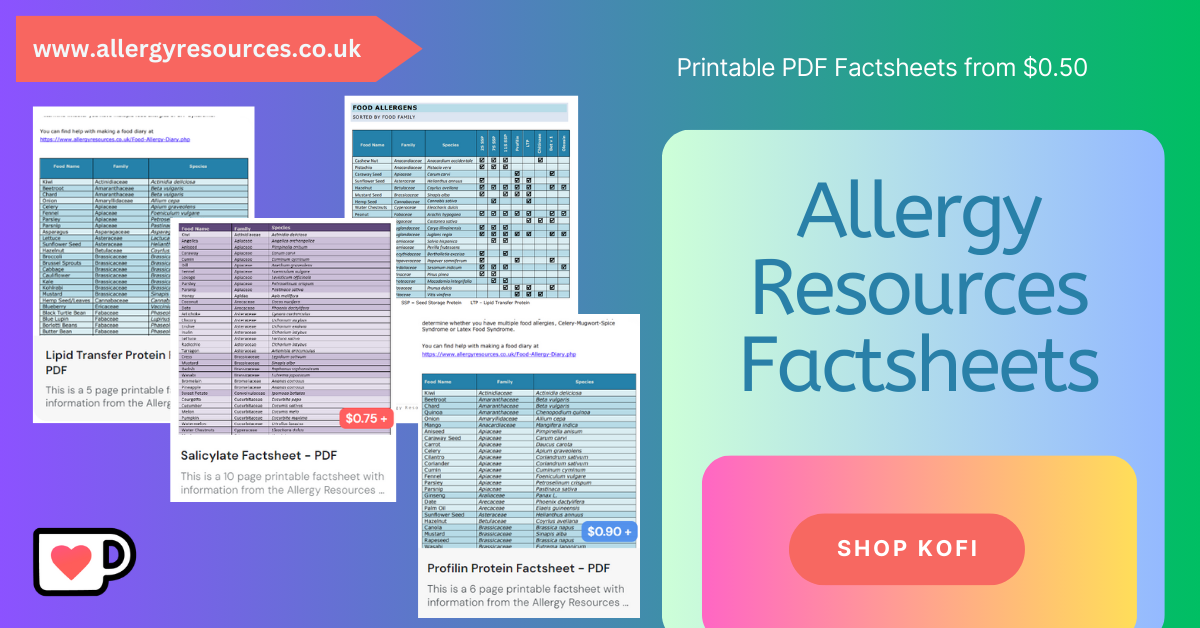
GOAT MILK ALLERGY
Key Allergens
Goat milk is commonly drunk in many countries and it's by-products, such as goat cheese remain popular.
The allergenic proteins in goat milk are generally split into albumins (commonly called whey) and casein. In human milk the split is usually 60% whey to 40% casein. In goat milk the split is 20% whey to 80% casein. This is a similar composition to cow's milk. This massive difference in composition is thought to be the cause of what causes IgE allergic reaction to mammalian milk, with most people being allergic to casein proteins in the milk.
Some breeds of goat make milk lacking α-s1-casein, which is the main casein in cow milk, this is less allergenic than goat milk with α-s2-casein, which is more typical for many goat breeds.
Most goat milk products are not suitable for those suffering from cow's milk protein allergy. Goat milk remains a dairy product and is best avoided for those allergic to cows milk.
Goat milk and cheese contains as much lactose as cows milk, so is also not suitable for those suffering from lactose intolerance.
The allergenic proteins in goat milk are generally split into albumins (commonly called whey) and casein. In human milk the split is usually 60% whey to 40% casein. In goat milk the split is 20% whey to 80% casein. This is a similar composition to cow's milk. This massive difference in composition is thought to be the cause of what causes IgE allergic reaction to mammalian milk, with most people being allergic to casein proteins in the milk.
Some breeds of goat make milk lacking α-s1-casein, which is the main casein in cow milk, this is less allergenic than goat milk with α-s2-casein, which is more typical for many goat breeds.
Most goat milk products are not suitable for those suffering from cow's milk protein allergy. Goat milk remains a dairy product and is best avoided for those allergic to cows milk.
Goat milk and cheese contains as much lactose as cows milk, so is also not suitable for those suffering from lactose intolerance.
Food Intolerances

Goat milk is not suitable for those who are intolerant to lactose. Lactose is a sugar found in milk and dairy products. After it is eaten it is broken down by the body into two digestible sugars. If you are intolerant to lactose it means that your body does not make enough of the enzyme lactase which breaks down the sugars. The gastrointestinal symptoms of lactose intolerance are caused by the body being unable to succesfully breakdown the sugars which cause bloating, discomfort and diarrhoea.
Lactose is a FODMAP food. FODMAP stands for Fermentable oligosaccharides, disaccharides, monosaccharides and polyols. Foods high in FODMAPs can cause symptoms of food intolerance, affecting the gastro intestinal system and this can be mistaken for a true IgE food allergy.
You can read more about Food Intolerances on the dedicated Food Intolerance Page.
Associated Syndromes
Cross Reactivity
Cow, buffalo and sheep milk could all be cross reactive with goat milk due to their similar composition.
Food lists are not exhaustive, the most up to date information is on the Cross Reactivity Tool.
Food lists are not exhaustive, the most up to date information is on the Cross Reactivity Tool.
Resources
Websites
Allergen Encyclopedia - Goat Milk
Allergic Living - Is Goat’s Milk Safe to Give a Child with Dairy Allergy?
Articles and Journals
Nutritional Profile, Processing and Potential Products: A Comparative Review of Goat Milk, 2022
Goat's milk allergy in a family following household sensitization to goat's milk soap, 2021
Goat Milk in Human Nutrition and Health – A Review, 2017
Comparative evaluation of allergic sensitization to milk proteins of cow, buffalo and goat, 2013
The challenge of cow milk protein allergy, 2007
Allergy to goat and sheep milk without allergy to cow's milk, 2006
Cross-reactivity between milk proteins from different animal species, 1999
Let me know if you found any of these interesting or useful.
If you spot an article or research that you think is interesting you can message me or tag me on Facebook or Twitter - links at the bottom of the page.